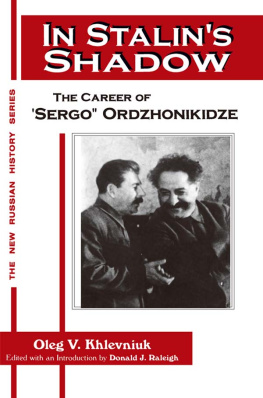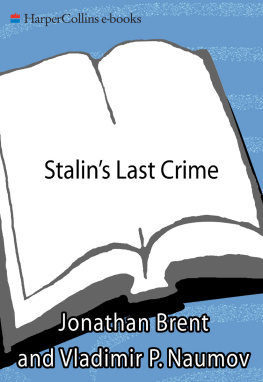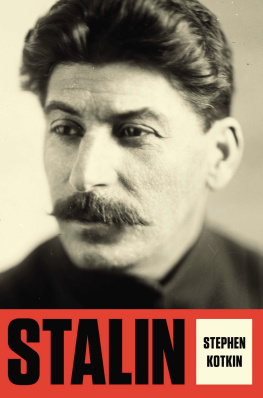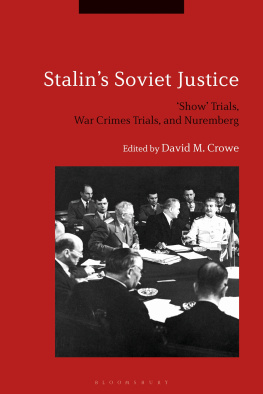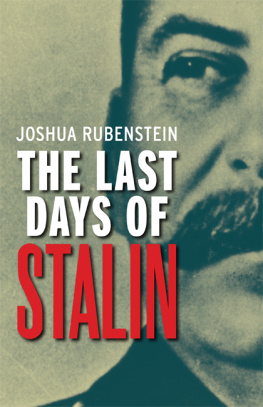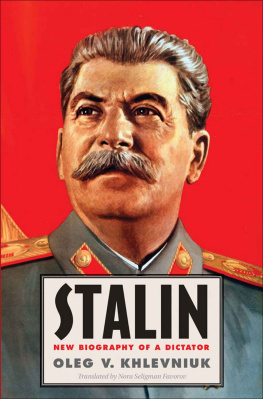Stalins Genocides
HUMAN RIGHTS AND CRIMES AGAINST HUMANITY
Series Editor: Eric D. Weitz
Echoes of Violence: Letters from
a War Reporter by Carolin Emcke
Cannibal Island: Death in a Siberian Gulag
by Nicolas Werth. Translated by Steven Rendall
with a foreword by Jan T. Gross
Torture and the Twilight of Empire from
Algiers to Baghdad by Marnia Lazreg
Terror in Chechnya: Russia
and the Tragedy of Civilians in War
by Emma Gilligan
If You Leave Us Here, We Will Die:
How Genocide Was Stopped in East Timor
by Geoffrey Robinson
Stalins Genocides by Norman M. Naimark
Against Massacre: Humanitarian Interventions in the
Ottoman Empire, 18151914 by Davide Rodogno
All the Missing Souls: A Personal History of the
War Crimes Tribunals by David Scheffer
Stalins
Genocides
Norman M. Naimark

Copyright 2010 by Princeton University Press
Published by Princeton University Press, 41 William Street,
Princeton, New Jersey 08540
In the United Kingdom: Princeton University Press,
6 Oxford Street, Woodstock, Oxfordshire OX20 1TW
press.princeton.edu
All Rights Reserved
Fourth printing, and first paperback printing, 2012
Paperback ISBN 978-0-691-15238-7
THE LIBRARY OF CONGRESS HAS CATALOGED THE CLOTH EDITION
OF THIS BOOK AS FOLLOWS
Naimark, Norman M.
Stalins genocides / Norman M. Naimark.
p. cm. (Human rights and crimes against humanity)
Includes bibliographical references and index.
ISBN 978-0-691-14784-0 (hardcover : alk. paper)
1. GenocideSoviet UnionHistory. 2. Mass murder
Soviet UnionHistory. 3. Political purgesSoviet UnionHistory.
4. Political persecutionSoviet UnionHistory. 5. Stalin, Joseph,
18791953. 6. Soviet UnionPolitics and government19171936.
7. Soviet UnionPolitics and government19361953. 8. Human
rightsSoviet UnionHistory. 9. International lawSoviet Union
History. 10. Soviet UnionHistory19251953. I. Title.
DK268.4.N35 2010 947.0842dc22
2010019063
British Library Cataloging-in-Publication Data is available
This book has been composed in Bauer Bodoni
Printed on acid-free paper.
Printed in the United States of America
5 7 9 10 8 6 4
CONTENTS
ACKNOWLEDGMENTS
This study grew out of a long-term preoccupation with the history of genocide and the way Stalin and his crimes should be viewed in the context of that history. I explored some of these problems at a series of conferences and symposia that helped develop my views. I should mention in particular the Mellon Foundation Sawyer Seminar Series on Mass Killing at the Center for Advanced Study on the Behavioral Sciences at Stanford, which I organized together with Ronald G. Suny; a conference on Totalitarianism sponsored by Telos and organized by Russell Berman at Stanford; and a conference in honor of Robert Conquest, held at the American Enterprise Institute and organized by Paul Hollander. I am also beholden to those colleagues who commented on this work at a Hitler-Stalin Workshop at Yale, chaired by Timothy Snyder, and at the Workshop of Turkish and Armenian Scholars (WATS) held at Berkeley and led by Gerard Libaridian. The comments and criticisms of participants at these conferences and meetings proved extremely helpful in sharpening my views of Stalin and the genocide question. Several published essays resulted from these talks and papers,
Similarly, I benefited enormously from the critiques of the draft manuscript by a number of distinguished scholars: Paul Gregory, Hiroaki Kuromiya, David Shearer, Robert Service, Yuri Slezkine, Ronald Suny, Amir Weiner, and Eric Weitz. The readers at Princeton University Press, Jan T. Gross and Lynne Viola, also provided valuable comments and suggestions. Throughout my professional life, I have had the remarkably good fortune of learning from my friends and colleagues in the field. This book, in particular, owes a lot to the input of these readers. Their criticisms, observations, and corrections helped me avoid some pretty bad mistakes and pointed out holes in my argument. They gave me additional sources to read and new perspectives to include. At the same time, I have dug in my heels on a number of issues where many of my friends thought differently. That familiar disclaimer works in this case in spades: I alone am responsible for the views that are expressed in this book.
I also am beholden to my friend and colleague Amir Eshel, director of the Forum for Contemporary Europe at Stanfords Freeman-Spogli Institute, for having helped arrange the lecture at Suhrkamp in Berlin, which was the inspiration for actually writing a small book on Stalin. Thomas Sparr at Suhrkamp has been a generous and encouraging editor and a strong advocate of the Stanford-Suhrkamp lecture program. Brigitta van Rheinberg at Princeton University Press has been as supportive and understanding an editor as any author could hope for.
I have also had some very helpful research assistants at Stanford, who have not only chased down sources but also shared their views of the subject with me. None has been more important to the completion of this project than Valentin Bolotnyy, who has become a real friend in the process of doing this work. As usual, the archivists and staff of the invaluable Hoover Institute Archives have been wonderfully helpful and patient with my requests. My gratitude to Kathryn Ward for her close reading of the books page proofs.
Finally, I would like to thank my wife, Katherine Jolluck, my son, Ben, and my daughters, Anna and Sarah. The darkness that inevitably comes from immersing myself in Stalinism lifts immediately when encountering my joyful family. There is an added benefit in that Katherine is an accomplished historian and superb editor, who reads critically everything I write. This book is dedicated with gratitude and love to her.
Stalins Genocides
INTRODUCTION
This short bookreally an extended essayis intended to argue that Stalins mass killings of the 1930s should be classified as genocide. This argument is made more difficult by the fact that there was no single act of genocide in the Soviet case, but rather a series of interrelated attacks on class enemies and enemies of the people, metonyms for diverse alleged opponents of the Soviet state. Episodes of mass killing also took a variety of forms, some involving mass executions, others exile in special settlements and camps of the Gulag, where many hundreds of thousands died from the unusually harsh character of arrest, internment, and interrogation, on the one hand, and hellish conditions of transport, housing, sustenance, and forced labor, on the other.
The social and national categories of the supposed enemies of the USSR changed and shifted over time; the justifications for the assaults on groups of Soviet citizens (and foreigners in the Soviet Union) were similarly labile. Yet Stalin and his lieutenants connected these genocidal attacks to the tenets of Marxism-Leninism-Stalinism and used similar police, judicial, and extrajudicial means of implementing them. Both Soviet party and state institutions were involved, as Stalin applied the impressive instruments of exerting power and control created by the Bolshevik revolution to strike at his opponents and potential opponents, real andfor the greatest partimagined. As the result of Stalins rule in the 1930s and early 1940s, many millions of innocent people were shot, starved to death, or died in detention and exile. It is long since time to consider this story an important chapter in the history of genocide.
Next page


